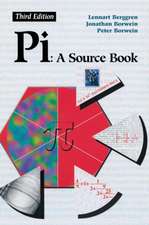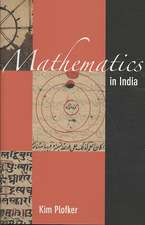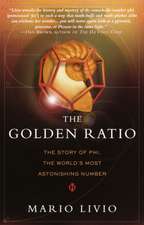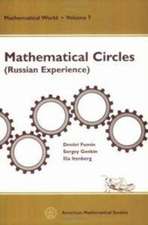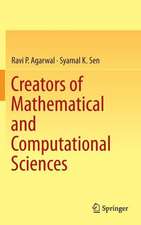Intellectual Pursuits of Nicolas Rashevsky: The Queer Duck of Biology: Science Networks. Historical Studies, cartea 55
Autor Maya M. Shmailoven Limba Engleză Hardback – 7 sep 2016
“Most modern-day biologists have never heard of Rashevsky. Why?” In what constitutes the first detailed biography of theoretical physicist Nicolas Rashevsky (1899-1972), spanning key aspects of his long scientific career, the book captures Rashevsky’s ways of thinking about the place mathematical biology should have in biology and his personal struggle for the acceptance of his views. It brings to light the tension between mathematicians, theoretical physicists and biologists when it comes to the introduction of physico-mathematical tools into biology. Rashevsky’s successes and failures in his efforts to establish mathematical biology as a subfield of biology provide an important test case for understanding the role of theory (in particular mathematics) in understanding the natural world.
With the biological sciences moving towards new vistas of inter- and multi-disciplinary collaborations and research programs, the book will appeal to a wide readership ranging from historians, sociologists, and ethnographers of American science and culture to students and general readers with an interest in the history of the life sciences, mathematical biology and the social construction of science.
| Toate formatele și edițiile | Preț | Express |
|---|---|---|
| Paperback (1) | 636.80 lei 6-8 săpt. | |
| Springer International Publishing – 22 apr 2018 | 636.80 lei 6-8 săpt. | |
| Hardback (1) | 643.00 lei 6-8 săpt. | |
| Springer International Publishing – 7 sep 2016 | 643.00 lei 6-8 săpt. |
Din seria Science Networks. Historical Studies
- 18%
 Preț: 796.31 lei
Preț: 796.31 lei - 15%
 Preț: 652.49 lei
Preț: 652.49 lei - 18%
 Preț: 787.15 lei
Preț: 787.15 lei -
 Preț: 385.25 lei
Preț: 385.25 lei -
 Preț: 489.30 lei
Preț: 489.30 lei - 15%
 Preț: 476.75 lei
Preț: 476.75 lei -
 Preț: 389.31 lei
Preț: 389.31 lei - 15%
 Preț: 699.59 lei
Preț: 699.59 lei - 15%
 Preț: 660.37 lei
Preț: 660.37 lei - 15%
 Preț: 531.59 lei
Preț: 531.59 lei - 24%
 Preț: 909.25 lei
Preț: 909.25 lei -
 Preț: 396.24 lei
Preț: 396.24 lei - 18%
 Preț: 903.17 lei
Preț: 903.17 lei -
 Preț: 382.36 lei
Preț: 382.36 lei -
 Preț: 395.25 lei
Preț: 395.25 lei - 15%
 Preț: 647.73 lei
Preț: 647.73 lei - 15%
 Preț: 702.87 lei
Preț: 702.87 lei - 15%
 Preț: 674.74 lei
Preț: 674.74 lei - 15%
 Preț: 655.60 lei
Preț: 655.60 lei - 15%
 Preț: 650.19 lei
Preț: 650.19 lei - 15%
 Preț: 644.82 lei
Preț: 644.82 lei - 15%
 Preț: 646.62 lei
Preț: 646.62 lei - 18%
 Preț: 1119.08 lei
Preț: 1119.08 lei - 18%
 Preț: 1140.86 lei
Preț: 1140.86 lei - 20%
 Preț: 595.47 lei
Preț: 595.47 lei - 20%
 Preț: 596.59 lei
Preț: 596.59 lei - 15%
 Preț: 649.06 lei
Preț: 649.06 lei - 20%
 Preț: 567.62 lei
Preț: 567.62 lei - 15%
 Preț: 644.95 lei
Preț: 644.95 lei -
 Preț: 399.12 lei
Preț: 399.12 lei - 18%
 Preț: 1390.11 lei
Preț: 1390.11 lei -
 Preț: 361.03 lei
Preț: 361.03 lei - 18%
 Preț: 1395.63 lei
Preț: 1395.63 lei - 15%
 Preț: 642.36 lei
Preț: 642.36 lei - 15%
 Preț: 648.24 lei
Preț: 648.24 lei - 15%
 Preț: 649.06 lei
Preț: 649.06 lei -
 Preț: 392.37 lei
Preț: 392.37 lei
Preț: 643.00 lei
Preț vechi: 756.47 lei
-15% Nou
Puncte Express: 965
Preț estimativ în valută:
123.10€ • 128.44$ • 103.19£
123.10€ • 128.44$ • 103.19£
Carte tipărită la comandă
Livrare economică 13-27 martie
Preluare comenzi: 021 569.72.76
Specificații
ISBN-13: 9783319399218
ISBN-10: 3319399217
Pagini: 226
Ilustrații: XXI, 199 p. 6 illus., 1 illus. in color.
Dimensiuni: 155 x 235 x 14 mm
Greutate: 0.49 kg
Ediția:1st ed. 2016
Editura: Springer International Publishing
Colecția Birkhäuser
Seria Science Networks. Historical Studies
Locul publicării:Cham, Switzerland
ISBN-10: 3319399217
Pagini: 226
Ilustrații: XXI, 199 p. 6 illus., 1 illus. in color.
Dimensiuni: 155 x 235 x 14 mm
Greutate: 0.49 kg
Ediția:1st ed. 2016
Editura: Springer International Publishing
Colecția Birkhäuser
Seria Science Networks. Historical Studies
Locul publicării:Cham, Switzerland
Cuprins
Preface.- Introduction.- Chapter I: An Overview: Rashevsky's Mathematical Biology.- A Brief Sketch of Rashevsky's Life.- Crossing Boundaries: When Interest Crystallizes.- Rashevsky's Mathematical Biologist.- 1st Arc of Intellectual Trajectory.- An Outsider's Sad Lot.- Chapter II: Chicago Experiments in Mathematical Biology.- In Search of a "Queer Duck".- A Forward-Looking Policy in the Division of Biological Sciences.- The Scientific Pathfinder.- An Experiment in Scientific Procedure: the Cold Spring Harbor Symposia on Quantitative Biology.- The Queer Ducks: The University of Chicago Group of Mathematical Biologists.- Chapter III: Scientific Experiment: Attempts to Converse across Disciplinary Boundaries Using the Method of Approximation .- Cell division and cellular aggregates.- Growing up and Making a Name.- Making "an Honest Woman" of Mathematical Biology.- Chapter IV: Breaking through the Iron Curtain.- In search of the Holy Grail: Discovering Form and Relations in Biology.- Betting on a Dark Horse.- A New Reign in Chicago.- Towards the Golden Years.- Chapter V: How Experiments End: The Drama at Chicago.- Pawns on a Chess Board.- "Mustard Plaster".- The End.- Trotsky of Mathematical Biology.- Last of the Mohicans.- Conclusions.- Bibliography.
Recenzii
“This book is a passionate account of the life and ideas of Nicolas Rashevsky (1899-1972), one of the earliest proponents of employing quantitative and deductive methods in theoretical biology and a great contributor towards the establishment and recognition of mathematical biology as an independent, institutionalized discipline. … The book is potentially of interest not only to mathematical biologists … but to anyone with interest in the biographies of 20th century remarkable scientists.” (Paul Georgescu, zbMATH 1353.92005, 2017)
“The bulk of the text covers Rashevsky’s professional successes and failures during his thirty year academic career at the University of Chicago. … The book mainly focuses on the evolution of his big picture views on how one should use mathematics to study biology and sociology theoretically. … the book will mostly be of interest to people working in mathematical biology who are curious about some of its history and one of its twentiethcentury pioneers.” (Geoffrey Dietz, MAA Reviews, maa.org, November, 2016)
Textul de pe ultima copertă
Who was Nicolas Rashevsky? To answer that question, this book draws on Rashevsky’s unexplored personal archival papers and shares interviews with his family, students and friends, as well as discussions with biologists and mathematical biologists, to flesh out and complete the picture.
“Most modern-day biologists have never heard of Rashevsky. Why?” In what constitutes the first detailed biography of theoretical physicist Nicolas Rashevsky (1899-1972), spanning key aspects of his long scientific career, the book captures Rashevsky’s ways of thinking about the place mathematical biology should have in biology and his personal struggle for the acceptance of his views. It brings to light the tension between mathematicians, theoretical physicists and biologists when it comes to the introduction of physico-mathematical tools into biology. Rashevsky’s successes and failures in his efforts to establish mathematical biology as a subfield of biology provide an important test case for understanding the role of theory (in particular mathematics) in understanding the natural world.
With the biological sciences moving towards new vistas of inter- and multi-disciplinary collaborations and research programs, the book will appeal to a wide readership ranging from historians, sociologists, and ethnographers of American science and culture to students and general readers with an interest in the history of the life sciences, mathematical biology and the social construction of science.
“Most modern-day biologists have never heard of Rashevsky. Why?” In what constitutes the first detailed biography of theoretical physicist Nicolas Rashevsky (1899-1972), spanning key aspects of his long scientific career, the book captures Rashevsky’s ways of thinking about the place mathematical biology should have in biology and his personal struggle for the acceptance of his views. It brings to light the tension between mathematicians, theoretical physicists and biologists when it comes to the introduction of physico-mathematical tools into biology. Rashevsky’s successes and failures in his efforts to establish mathematical biology as a subfield of biology provide an important test case for understanding the role of theory (in particular mathematics) in understanding the natural world.
With the biological sciences moving towards new vistas of inter- and multi-disciplinary collaborations and research programs, the book will appeal to a wide readership ranging from historians, sociologists, and ethnographers of American science and culture to students and general readers with an interest in the history of the life sciences, mathematical biology and the social construction of science.
Caracteristici
Offers the first comprehensive and uncompromising biography of the hitherto unexplored life of Nicolas Rashevsky Presents an exciting and critical discussion of Rashevsky’s intellectual profile and an account of his winding path Puts the spotlight on Rashevsky’s overlooked significance in the history of biology and his contribution to its “patchwork design” Presents a fascinating case study providing the first in-depth exploration of the importance of the role of outsiders in biology Features an extraordinary study on the introduction of mathematical thinking into biology Includes supplementary material: sn.pub/extras







